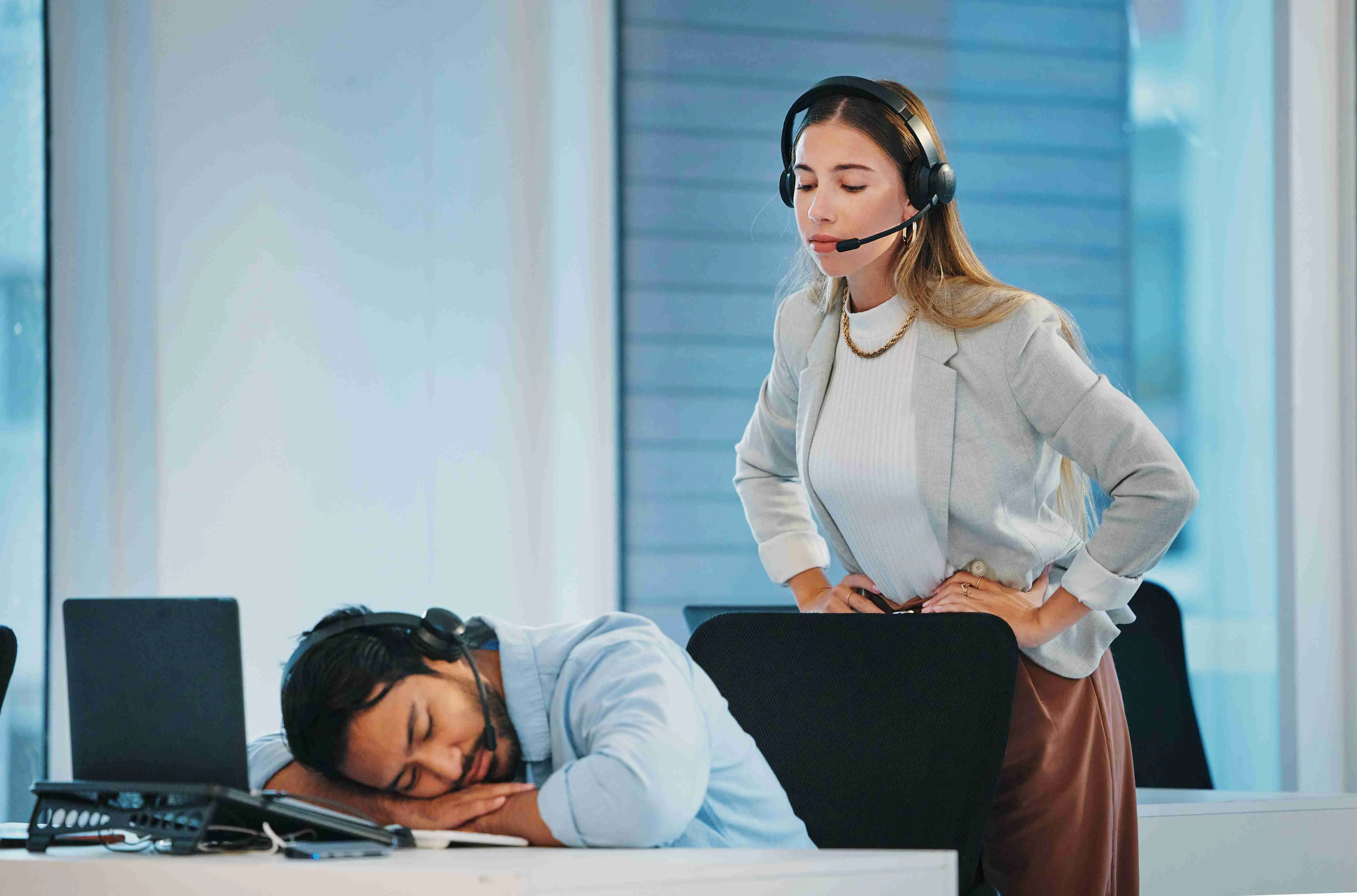Many people struggle to stay awake and alert regularly. Excessive sleepiness can significantly impact daily life, productivity, and overall well-being.
This article delves into the various factors contributing to excessive sleepiness issue and explores practical strategies to combat it effectively.
What is Excessive Sleepiness?
Excessive sleepiness, also known as hypersomnia, is a condition characterized by persistent feelings of drowsiness, fatigue, and an overwhelming urge to sleep during the day, even after getting adequate sleep at night. It is a common issue that can significantly impact your daily life, productivity, and overall well-being.
Excessive sleepiness is not just feeling tired or having a bad night's sleep; it is a chronic condition that can have various underlying causes. It is essential to understand the nature of this condition and its potential impact on your health so that you can take appropriate measures and seek professional help if needed.
Excessive Sleepiness Causes

Excessive sleepiness can be attributed to a variety of factors, including medical conditions, lifestyle choices, and environmental influences. Identifying the root cause is essential for effective management and treatment.
Medical Conditions
- Neurological Conditions: Disorders such as Parkinson's disease, multiple sclerosis, and traumatic brain injuries can disrupt normal sleep patterns.
- Endocrine Disorders: Conditions like hypothyroidism and diabetes can lead to fatigue and excessive sleepiness due to hormonal imbalances.
- Mental Health Conditions: Depression, anxiety, and other mental health issues can significantly affect sleep quality and lead to increased sleepiness during the day.
Sleep Disorders
- Obstructive Sleep Apnea (OSA): Sleep Apnea condition where breathing repeatedly stops and starts during sleep, leading to poor sleep quality and daytime drowsiness.
- Narcolepsy: Narcolepsy is a chronic sleep disorder characterized by overwhelming daytime drowsiness and sudden attacks of sleep.
- Idiopathic Hypersomnia: A condition where individuals experience excessive sleepiness without an identifiable cause.
Lifestyle Factors
- Irregular Sleep Schedule: Inconsistent bedtimes and wake times can disrupt the body's internal clock, leading to sleepiness.
- Shift Work Disorder: Working non-traditional hours can interfere with the body's circadian rhythm, causing sleep disturbances known as the shift work disorder.
- Poor Sleep Hygiene: Habits such as using electronic devices before bed, consuming caffeine or alcohol late in the day, and having an uncomfortable sleep environment can affect sleep quality.
- Sedentary Lifestyle: Lack of physical activity can lead to fatigue and increased sleepiness.
- Stress and Anxiety: High stress levels and anxiety can interfere with the ability to fall asleep and stay asleep.
Environmental Influences
- Noise Pollution: Excessive noise can disrupt sleep and contribute to daytime sleepiness.
- Uncomfortable Temperature: Sleeping in an environment that is too hot or too cold can affect sleep quality.
- Altitude Changes: High altitudes can affect breathing during sleep and lead to increased sleepiness.
Symptoms of Excessive Sleepiness

Excessive sleepiness can manifest itself through various physical, cognitive, and emotional symptoms. Being aware of these signs can help you recognize the condition and seek appropriate treatment.
Physical Symptoms
- Persistent Fatigue: This is characterized by a constant feeling of tiredness that does not improve even after getting enough rest or sleep. It can affect daily activities and overall quality of life.
- Involuntary Napping: People may find themselves falling asleep unintentionally during the day, often at inappropriate times, such as during meetings or while driving, which can be dangerous.
- Sluggishness: This involves a general sense of lethargy and lack of energy, making it difficult to perform everyday tasks or engage in physical activities.
- Headaches: Frequent headaches can occur, often linked to poor sleep quality or sleep disorders such as sleep apnea, which disrupt normal sleep patterns.
- Dry Mouth and Eyes: These symptoms can result from breathing issues during sleep, such as sleep apnea or dehydration. They can cause discomfort and may lead to further sleep disturbances.
Emotional Symptoms
- Difficulty Concentrating: Individuals may struggle to focus on tasks, maintain attention, or process information effectively, impacting work or academic performance.
- Memory Problems: Challenges in recalling information or events can occur, affecting both short-term and long-term memory and leading to forgetfulness.
- Irritability and Mood Swings: There may be increased sensitivity and emotional instability, leading to frequent mood changes and irritability over minor issues.
- Lack of Motivation: A reduced drive to engage in activities or pursue goals can be evident, leading to decreased productivity and interest in hobbies or social interactions.
- Impaired Decision-Making: Difficulty in making choices or solving problems effectively can arise, affecting both personal and professional life decisions.
How Excessive Sleepiness Affects Health?
Excessive sleepiness can have far-reaching consequences for your overall health and well-being, both in the short and long term.
Short-term Effects
- Reduced Productivity: Excessive sleepiness can impair cognitive functions, leading to decreased concentration, slower reaction times, and poor decision-making, which affects productivity at work or school.
- Increased Risk of Accidents: Excessive sleepiness due to excessive sleepiness can be as impaired as alcohol consumption when driving or operating machinery, increasing the risk of accidents.
- Strained Relationships: Irritability and mood swings caused by the sensation of excessive sleepiness can lead to misunderstandings and conflicts in personal and professional relationships.
Long-term Effects
- Metabolic Disorders: Excessive sleep can disrupt hormones that regulate appetite, leading to weight gain and increasing the risk of obesity and diabetes.
- Cardiovascular Issues: Hypersomnia treatment is linked to an increased risk of hypertension, heart disease, and stroke due to its effect on blood pressure and inflammation.
- Mental Health Concerns: Falling asleep during the day is associated with mental health issues like depression and anxiety, as it affects neurotransmitter balance and emotional regulation.
- Immune System Dysfunction: Oversleeping disorder can significantly impact the immune system. During sleep, the body produces cytokines, proteins that help regulate immune responses and inflammation. When sleep is insufficient, cytokine production decreases, weakening the immune response. This can lead to increased infection vulnerability, slower recovery from illness, and inflammation.
Treatment for Excessive Sleepiness
The first step in treating excessive sleepiness is identifying and addressing any underlying causes. These may include sleep disorders such as sleep apnea, narcolepsy, or insomnia.
Addressing Underlying Causes
Medical conditions like depression, anxiety, or hypothyroidism can also contribute to excessive sleepiness. A thorough evaluation by a healthcare professional is essential to determine the root cause and develop an appropriate treatment plan.
Medications
In some cases, medications may be necessary to help manage excessive sleepiness. These can include:
- Stimulants: Drugs like modafinil or armodafinil can help increase wakefulness in individuals with narcolepsy or shift work sleep disorder.
- Antidepressants: For those whose sleepiness is linked to depression, antidepressants may be prescribed.
- Other Drugs: A healthcare professional might advise taking other drugs, depending on the underlying cause.
Lifestyle Changes to Combat Excessive Sleepiness

Implementing lifestyle changes can often help alleviate excessive sleepiness and improve overall sleep quality. Here are some recommended strategies:
Sleep Hygiene Practices
- Establish a Consistent Sleep Schedule: Go to bed and wake up at the same time every day, even on weekends, to regulate your body's internal clock.
- Create a Sleep-Friendly Environment: Ensure your bedroom is quiet, dark, and cool. Use earplugs, an eye mask, or a white noise machine if needed.
- Develop a Relaxing Bedtime Routine: Engage in calming activities before bed, such as reading, taking a warm bath, or practicing meditation.
- Limit Screen Time Before Bed: Avoid screens at least an hour before bedtime, as the blue light emitted can interfere with your ability to fall asleep.
Check out Best Sleep Hygiene Practices.
Diet and Exercise
- Maintain a Balanced Diet: Eat various foods to ensure you're getting all the necessary nutrition. Avoid heavy or large meals close to bedtime.
- Stay Hydrated: Drink enough water throughout the day, but reduce intake before bed to avoid nighttime awakenings.
- Incorporate Regular Exercise: Engage in at least 30 minutes of moderate physical activity most days of the week, but avoid vigorous activity close to bedtime.
- Limit Caffeine and Alcohol: Reduce consumption of caffeine and alcohol, especially in the afternoon and evening, as they can disrupt sleep patterns.
Daily Routines and Habits
- Take Scheduled Naps: If needed, take short naps (20-30 minutes) earlier in the day to boost alertness without affecting nighttime sleep.
- Stay Hydrated and Snack Wisely: Keep healthy snacks on hand and stay hydrated to maintain energy levels throughout the day.
- Practice Stress Management Techniques: Use techniques like deep breathing, yoga, or mindfulness to reduce stress, which can interfere with sleep.
- Seek Support: If lifestyle changes aren't enough, consider speaking with a healthcare provider for additional support or to rule out underlying conditions.
Preventing Excessive Sleepiness

By following these guidelines, you can help prevent excessive sleepiness and maintain overall health and well-being.
Monitoring Health and Wellness
- Balanced Diet: Eat a healthy diet rich in fruits, vegetables, and whole grains to maintain energy levels.
- Stay Hydrated: Remember to drink water consistently throughout the day and adjust your intake based on activity level, climate, and individual needs throughout the day.
- Regular Check-Ups: Visit your healthcare provider regularly to monitor for any underlying health issues that could affect sleep.
- Manage Stress: Practice relaxation techniques such as meditation, deep breathing, or yoga to reduce stress levels.
Recognizing Early Signs
- Daytime Fatigue: Notice if you feel excessively tired during the day despite getting enough sleep.
- Mood Changes: Be aware of increased irritability or mood swings, which can be signs of sleep deprivation.
- Difficulty Concentrating: Pay attention to any trouble focusing or remembering things.
- Unusual Sleep Patterns: Track any changes in your sleep patterns or behaviors, such as snoring or restlessness.
FAQs
Is excessive sleepiness the same as fatigue?
While excessive sleepiness and fatigue can be related, they are distinct conditions. Fatigue refers to a general feeling of tiredness or lack of energy, while excessive sleepiness involves an overwhelming urge to sleep or difficulty staying awake.
Can excessive sleepiness be cured?
The treatment approach for excessive sleepiness depends on the underlying cause. While some conditions can be cured or managed effectively with lifestyle changes or medical treatments, others may require ongoing management and monitoring of why you can't stay awake.
How much sleep is considered adequate?
The recommended amount of sleep varies by age, but most adults need between 7 and 9 hours of sleep per night. However, individual sleep needs can vary, and some people may require more or less sleep to feel well-rested.
Can stress cause excessive sleepiness?
Yes, chronic stress can contribute to sleep disturbances and excessive sleepiness. Stress can disrupt the body's natural sleep-wake cycle and make it difficult to fall asleep or stay asleep throughout the night.
Is it safe to take over-the-counter sleep aids for excessive sleepiness?
Over-the-counter sleep aids should be used with caution and under the guidance of a healthcare professional. While they may provide temporary relief, they can have side effects and may not address the underlying cause of excessive sleepiness.
Why do I want to sleep all the time?
Excessive sleepiness can be apparent in so many ways, including poor sleep quality, nodding off while sitting, sleeping all day, falling asleep randomly, underlying health conditions like sleep apnea or thyroid disorders, nutrient deficiencies, hormonal imbalances, or mental health issues such as depression. Lifestyle factors, including a sedentary routine, overworking, or high-stress levels, can also contribute.
Conclusion
Excessive sleepiness is more than just a minor inconvenience; it can be a signal of deeper health concerns or lifestyle imbalances.
By identifying the root causes and implementing effective strategies, such as improving sleep hygiene, managing stress, and seeking medical advice when necessary, individuals can reclaim their energy and enhance their quality of life.
Dom Abraham
As the lead content writer at Sleepiverse. Dom pours his heart into writing mattress reviews, bedding product reviews, and medically-reviewed health articles. Dom is from Portugal and likes to spend his free time writing on the beach as it gives him a sense of comfort. Aside from writing mattress reviews in front of the soothing beach view, Dom likes to experiment with new amazing food ideas.


